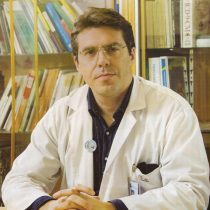Hospital Senhora da Oliveira, Guimarães, EPE
Area of expertise and Healthcare Provider’s contribution to care for patients within the MetabERN Network
Hospital Senhora da Oliveira – Guimarães (HSOG) is a Reference Center on Lysosomal Storage Disorders (LSD), located in the city of Guimarães in the North of Portugal.
HSOG was recognized by the Portuguese Ministry of Health as a Reference Center in LSD, in a joint corsortium with the National Institute of Health, the national patient’s organization Rarissimas and the Medicine School/Life and Health Sciences Institute (ICVS) of Minho University.
HSOG provides healthcare to approximately 250 patients with LSD, including nearly 230 patients with Fabry disease, being the largest Portuguese center of patients with LSD and the largest Iberian center of patients with Fabry disease, due to a documented founder effect of the disease in our geographic region. This particular feature confers to the health professionals of HSOG a unique clinical expertise and research potential on this field.
HSOG provides healthcare through a multidisciplinary team of health professionals specialized on LSD, including the several medical specialties, nursing, rehabilitation, nutrition, psychology and social care.
As a Reference Center on LSD, HSOG is a member on the National Committee of Treatment of LSD, participating in all therapeutic decisions of the patients with LSD in Portugal.
- HSOG is a patient-centred healthcare provider, involving patient’s organizations in the center activities. HSOG has a formal cooperation protocol with Rarissimas, the national patient’s organization for rare diseases, in the clinical, educational and research domains.
- HSOG is a teaching hospital that is associated to the Portuguese Medicine School of Minho University, therefore actively participating in undergraduate and postgraduate education and training.
- HSOG is involved in several educational and research activities concerning LSD. HSOG is coordinating or participating in several local, national or international research activities, including clinical research projects, with a main focus on screening and diagnosis of LSD and genetics and natural history of Fabry disease.
- HSOG brings all this clinical expertise, healthcare services and research potential on LSD to the Metabolic European Reference Network (MetabERN).


specific treatments and interventions provided by the HCP
Hospital Senhora da Oliveira – Guimarães (HSOG), as a Reference Center on Lysosomal Storage Disorders (LSD), provides specific treatment for patients with LSD, namely:
- Enzyme Replacement Therapy for Fabry disease, Gaucher disease, Pompe disease, Mucopolysaccharidoses (type I, II, IV and VI) and Lysosomal Acid Lipase Deficiency;
- Substrate Reduction Therapy for Gaucher disease and Niemann Pick type C.
HSOG has access to stem cell transplant within the national healthcare system network.
HSOG provides inpatient and outpatient care to patients with LSD by a multidisciplinary team of health professionals that includes physicians of several medical specialties, nurses, psychologists, nutritionists, physiotherapists and social assistants. The medical specialties include Cardiology, Neurology, Pediatrics, Internal Medicine, Genetics, Pneumology, Gastroenterology, Ophthalmology, Otorhinolaryngology, Surgery, Orthopedics, Physical Medicine and Rehabilitation, Dermatology, Psychiatry, Imunohemotherapy, Anesthesiology, Stomatology, Immunoallergology, Pathology, Rheumatology, Endocrinology, Gynecology, Urology, Nephrology, Hematology and Nuclear Medicine.
HSOG has an Ambulatory Care Unit, where patients with LSD receive intravenous treatments, namely enzyme replacement therapy. HSOG is also equipped with an Intensive Care Unit (ICU), Cardiac ICU and Neonatal ICU; Inpatient and Ambulatory Surgery Units; Obstetrics Unit, including Assisted Reproductive Medicine; Rehabilitation Department; Social Services; and inpatient and outpatient facilities for the treatment procedures regarding all the aforementioned medical specialties.
HSOG also provides diagnostic procedures, such as standard lab tests, electrocardiography, echocardiography, radiology (X-ray, ultrasound, CT, MRI), neuroradiology (CT, MRI), electroencephalography, electromyography, neuropsychiatry evaluation, plethysmography, polysomnography, bronchoscopy, endoscopy, fibro-scan, swallowing study, audiology, ophthalmology, organ biopsies and pathology analysis and access to nuclear medicine.
HSOG guarantees access to the biochemical and genetic analysis for the diagnosis and monitoring of LSD through a protocol with the National Institute of Health. HSOG has access to NGS and WES.
HSOG provides Rehabilitation care and supportive therapy, including corsetts, orthosis, insoles, braces, splints. HSOG provides care on non-invasive ventilation to inpatients and outpatients. HSOG has a specialized consultation for pain management. HSOG provides enteral nutrition therapy.
HSOG has a protocol with the national patient’s organization for rare diseases (Rarissimas). Rarissimas has Casa dos Marcos, that provides healthcare to patients with rare diseases, including rehabilitation and continuous integrated care; and Quinta dos Marcos, that provides specialized rehabilitation care focused on rare disease patients. HSOG has privileged access to these facilities through a protocol with Rarissimas. HSOG is also integrated in the National Network of Integrated Continuous Care.
HSOG has an Intrahospital Team of Palliative Care composed by physicians, nurses, social assistants, psychologist and spiritual assistant, all specialized in Palliative Care.
HSOG also provides social support to patients and families.
Rua dos Cutileiros, Creixomil - 4835-044 Guimarães, Portugal



